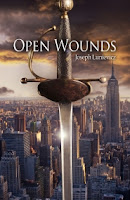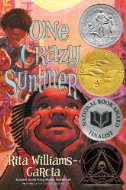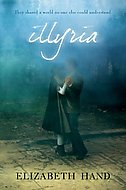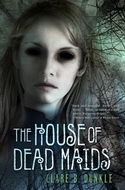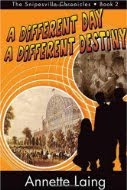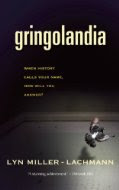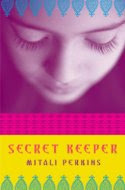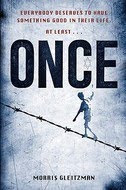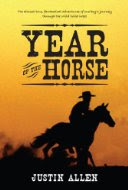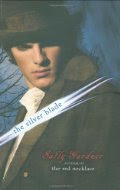 Friesner, Esther. Threads and Flames. New York: Viking, 2010. Print.
Friesner, Esther. Threads and Flames. New York: Viking, 2010. Print.[Book cover credit: librarything.com/work/9688825]
Booktalk:
Before Raisa even takes her first steps in NYC, she has managed to acquire a younger "sister," and she's managed to lose the older sister with whom she was supposed to live. Through the kindness of strangers, serendipity, and not a little bit of trial and error, she manages to get a great job that allows her to both support Brina, her younger sister, and look for Henda, her older sister. She's lucky; the Triangle Shirtwaist Factory is one of the best places a girl can work in 1911.
Review:
I think the best thing about Threads and Flames is that Friesner provides oodles of information and context without ever making me feel that I'm reading a book about the plight of immigrants or factory girls and how the injustices they faced lead to the tragedy of the Triangle fire.* I was simply reading an engaging story about Raisa's new life in America, complete with a little bit of mystery, a little bit of (the cutest without being the least bit saccharine) romance, and a whole lot of my-gumption-is-both-my-greatest-flaw-and-my-greatest-strength. And yet I finished the book knowing a lot about how the ill-treatment of immigrants in general and factory girls in particular created the perfect storm of awfulness that caused so many deaths in the fire.
While the book is undoubtedly about the Triangle fire, Raisa doesn't even start working at the Triangle Shirtwaist Factory until at least halfway through the book, maybe more. Usually, this delay of the "point" of the story would drive me batty, but in this instance, I didn't mind the wait. Raisa is such a fun character; she's so headstrong and determined to do what is right for her sisters, both Henda and Brina. It never occurs to her that she shouldn't take responsibility for Brina, even though she can barely take care of herself. I was rooting for her before she even got to Ellis Island. Raisa's little romance with Gavrel is also handled beautifully. When you're reading about Raisa who is on her own and working more than full time to make enough money to cover room and board for two people, it's easy to forget how young she is. Her relationship with Gavrel, however, with all of Raisa's do I or don't I feelings, constantly reminded me that she's just in her early teens. Their romance had all the little flutters of any middle grade romance, but with the added seriousness of two people, no matter how young, who work full time and both immediately start working even more when they "get serious." That's why they're both in the factory on the Saturday when it catches fire.
The fire itself is gruesome. The rush for the elevators after finding all the doors locked, the description of girls jumping from the windows rather than dying the flames, the display of unclaimed bodies that Raisa must search for Gavrel afterwards. The broken families who either found bodies to claim or were left with nothing. It's all so harsh. We see it all through Raisa who is still so determined to do what's right, who finds another job right away, and who becomes the strength and stability that Brina and Gavrel's family need in the fire's aftermath. Watching her continue on was possibly just as, if not more, heartbreaking as the fire itself. Slightly spoilery (highlight away): When the ending was happier than I would have expected, it did not feel like a cop-out on Friesner's part. I was just happy Raisa got a little bit of what she deserved.
There was recently a request on the yalsa-bk list-serv for fiction books that teach the reader something. I wish I had finished reading this book in time to suggest it! Threads and Flames is so informative, but it's still great fiction too. I highly recommend it!
Book source: Philly Free Library
* This book reminded me very much of Annette Laing's books in that way. I kept wanting to re-read A Different Day to see how Raisa's factory experience differed (or in a lot of ways didn't) from Hannah's experience 50 years earlier and across the pond.
Links to Amazon.com may be affiliate links for the Amazon Associates program. If you buy something through this link, I may receive a referral fee.
